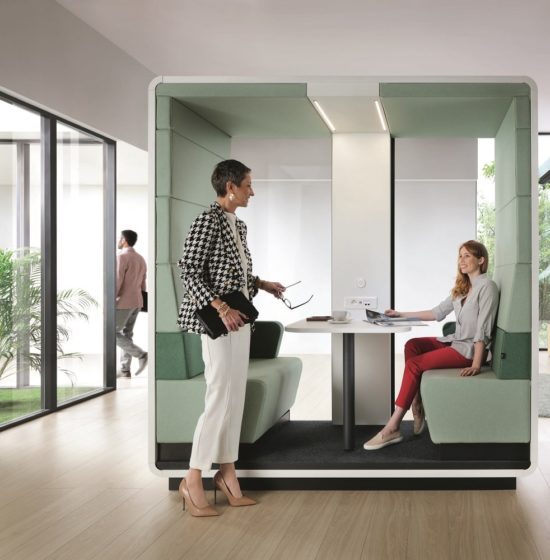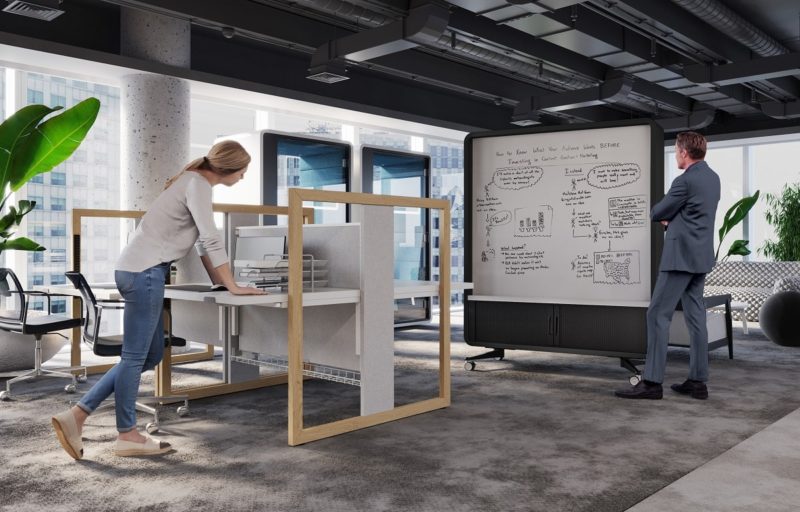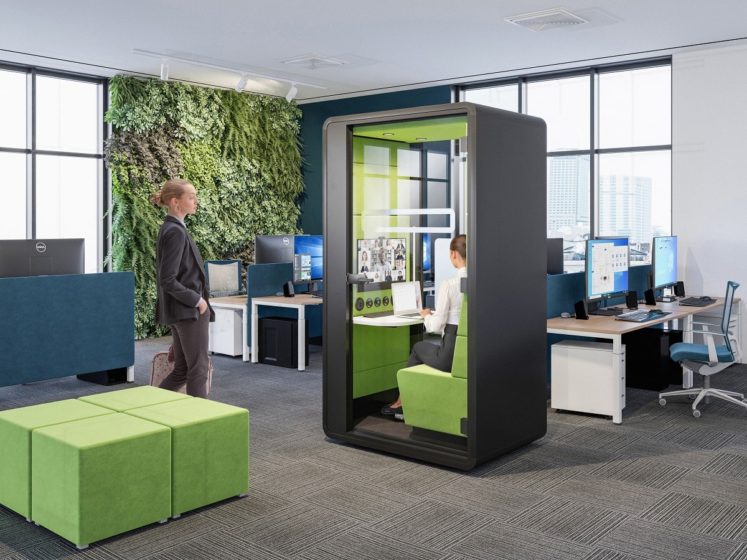How does Artificial Intelligence transform the world of business?
- Posted on: 16 April 2024
- By: Hushoffice Team
Has AI already taken over the world of business? What measures do companies implement to take advantage of it? Does the introduction of AI depend on business sectors? And, the fundamental question: how does it affect employees? Let’s take a closer look at AI.
How is AI changing business? – tl;dr
50% of companies all over the world used AI to some degree in 2022. As of today the majority integrate it in the field of cybersecurity and fraud management. Notably, the number of businesses adopting AI has risen by 270% since 2019. It is estimated that the global AI market will continue to expand at a compound annual rate of 38.1% until 2030.
HBR categorizes AI’s business applications into three classes. There is “process automation” of tasks such as large data transfers. There is “cognitive insight” or the use of algorithms to detect patterns and meaning. And there is “cognitive engagement” or the use of chatbots, intelligent agents, and machine learning. Their survey of business leaders found that teams have the most success when they take an incremental approach to AI implementation.
Despite the numerous AI applications, distinctly human work functions remain and will continue to be central to the working world. Creative thinking, problem-solving, and collaborative work demand the human touch and human presence. Therefore, experts primarily view AI as a pillar of support for people, particularly in dealing with monotonous, repetitive tasks. HushFree work and team meeting booths are self-contained, acoustic spaces designed for distinctly human activities, such as conducting business calls with clients or engaging in copywriting.
What is artificial intelligence?
The term Artificial Intelligence encompasses all kinds of computer software designed to carry out human-like activities, such as problem solving or writing. In essence, it refers to the ability of machines to analyse and draw conclusions from data, adjust to new situations, and succeed in tasks that have so far been the domain of human intelligence.
Without even realising it, we use AI in numerous daily-life situations. Personalised recommendations offered by streaming services. Suggested news feeds algorithmically customised to our profile. Product recommendations. Popular virtual assistants, such as Siri. AI-powered chatbots offering immediate assistance. While AI-driven mailbox filters keep our inbox neat and tidy, smart home appliances automatically adjust the temperature and lighting in our houses. Actually, even when you text someone or search queries, AI offers autocomplete suggestions. In a nutshell, Artificial Intelligence has already become part of the world we live in. And now, it is transforming the world of business
– says Mateusz Barczyk, Senior Brand Manager, Hushoffice.
In the world of business, AI manifests itself in automation, data analysis or chatbots.
Harvard Business Review organises the business applications of Artificial Intelligence into three main groups:
- process automation of tasks, for example, data transfers,
- cognitive insight that refers to the implementation of algorithms to identify patterns and meaning,
- cognitive engagement, involving the utilisation of chatbots, intelligent agents, or machine learning.
Their survey of business leaders revealed that adopting a step-by-step strategy is the key to a successful implementation of Artificial Intelligence.
50% of companies all over the world used AI to some degree in 2022.
Nowadays, more than 50% of businesses utilise AI solely for cybersecurity and fraud management. Notably, the number of companies adopting AI has risen by 270% since 2019. It is expected that the global AI market will continue to grow at a compound annual rate of 38.1% until 2030.

There is a separate category of tasks characterised by their tiring repetitiveness, being a major drain on people’s time. And such activities are exactly what AI is ideal for. By transferring or automating the wearisome work to bots or algorithms, you can shift your employees’ mental capacity to focus on upper-level assignments. For example, you can utilise digital assistants to tackle day-to-day employee inquiries, allowing HR personnel to focus their attention on more strategic tasks. Additionally, AI enables customers to obtain necessary information without the need to wait for human assistance. Also, automating paperwork delivery can streamline the onboarding process for new employees, improving their overall experience and making it more pleasant
– says Mateusz Barczyk, Senior Brand Manager, Hushoffice.
Most business owners believe that AI will considerably enhance business outcomes.
As many as 97% of company owners believe ChatGPT will positively affect their business, with 74% anticipating its beneficial impact on customer service, and half of them believing it will enhance the decision-making processes.
Approximately two-thirds of entrepreneurs believe that AI will enhance their customer relationships.
60% of business owners anticipate it will help boost sales, while 59% expect expense reductions and 42% believe it will optimise their job processes. Not to mention the fact that this is just a small fraction of AI’s potential involving all aspects from employee communication to website copy and translation.

John Deere implements AI solutions to feed the world.
The new self-driving tilling tractors manufactured by John Deere use AI-powered cameras to navigate obstacles in the field. Moreover, the company has also designed onboard camera systems detecting weeds and self-adjusting combine harvesters to optimise the harvesting process.
In MD Anderson Cancer Centre, AI is utilised to heal and optimise.
The MD Anderson Cancer Centre has implemented cognitive technologies to manage routine tasks, such as providing patients’ family members with restaurant recommendations or handling IT issues reported by staff. Indeed, the integration of AI has resulted in greater patient satisfaction, enhanced financial performance, and decreased amount of time devoted to repetitive data entry.

AI is gradually revolutionising business operations across numerous sectors.
From medicine and banking to the mining industry and construction. AI is a true game changer!
With AI entering the medical industry, cost savings can amount to $150B annually…
38% of healthcare providers are already implementing AI-powered technologies to assist in the patient diagnosing process. It is estimated that by 2026 key clinical health AI-assisted apps could generate financial savings amounting to $150 billion per year
In the mining sector, AI speeds up the processes 18-fold…
A Deloitte study revealed that implementing AI in the mining industry has significantly enhanced data processing by accelerating it 18-fold compared to the previous type of data management. Overall, AI has the potential to gradually improve occupational health and safety conditions for miners, enhance accuracy, reduce environmental footprints, and facilitate more efficient decision-making.
In the banking industry, AI can generate an additional value of $1B by the year 2035…
In this sector artificial intelligence may help detect frauds, improve customer digital experience, and provide more in-depth customer credit analysis. In fact, it is estimated that by 2035 AI-powered solutions will generate more than $1 billion in value to the banking sector.

Is AI likely to replace humans? Not really. Artificial intelligence will take over tasks, not jobs.
Artificial intelligence is not capable of replacing humans in tasks related to people management, expert knowledge application, or stakeholders communication. That’s why AI technology is not considered a threat, but a powerful supportive tool, facilitating numerous processes such as decision making or forecasting results.
The majority of AI applications are complementary to human work.
According to experts, the increasing integration of AI is not likely to threaten the existence of human jobs. Instead, employees will develop more specialist expertise, leading to the rise in popularity of skills such as content creation, or qualitative analysis.
Creative thinking is a significant human achievement.
You may find it surprising that several photos featured in this blog entry were created with the use of an AI-powered image generator. Although they are fascinating technological achievements, they’re not the real thing captured and designed with the precision and insightfulness of human mind and vision.
HushFree work booths. Spaces where purely human tasks are accomplished!
Video-conferencing with clients in hushFree.S acoustic call booth. Brainstorming with other team members in the hushFree.M meeting pod. Discussing important issues with stakeholders in the large hushFree.L cabin. HushFree pods are an outstanding work and meeting solution, designed to facilitate the performance of human tasks, offering privacy, comfort, and premium aesthetic experience.
Click here to find out more about our hushFree collection of mobile pods.
How is AI changing business? – summary
50% of companies all over the world used AI to some degree in 2022. As of today the majority integrate it in the field of cybersecurity and fraud management. Notably, the number of businesses adopting AI has risen by 270% since 2019. It is estimated that the global AI market will continue to expand at a compound annual rate of 38.1% until 2030.
Harvard Business Review divides the business applications of Artificial Intelligence into three main categories. The first one is the process automation of tasks, for example, data transfers. The second –cognitive insight – refers to the implementation of algorithms to detect patterns and meaning. The third class refers to cognitive engagement, involving the utilisation of chatbots, intelligent agents, or machine learning. Their survey of business leaders revealed that adopting a step-by-step strategy is the key to a successful implementation of Artificial Intelligence.
Despite the numerous AI applications, distinctly human work functions remain and will continue to be central to the working world. Creative thinking, problem-solving, and collaborative work demand the human touch and human presence. Therefore, experts primarily view AI as a pillar of support for people, particularly in dealing with monotonous, repetitive tasks. HushFree work and team meeting booths are self-contained, acoustic spaces designed for distinctly human activities, such as conducting business calls with clients or engaging in copywriting.
AI in business – frequently asked questions
How is AI used in business?
AI has a multitude of applications in business today. It is used for fraud detection and security, for data analysis and insights, and for other analytical tasks such as sales forecasting or lead scoring. AI can also be utilized in supply chain optimization and customer relationship management.
How will AI affect knowledge workers?
Many predict that AI will reduce the average knowledge workers cognitive load by handling the menial, repetitive tasks.
Where is AI in everyday life?
Smart phones, social media, and online shopping sites all use AI. From voice recognition to face recognition to algorithms to product recommendations, AI is well-embedded into most of our online experiences. Moreover, you likely encounter it in your home, whether you have smart appliances or an assistance such as Siri.






